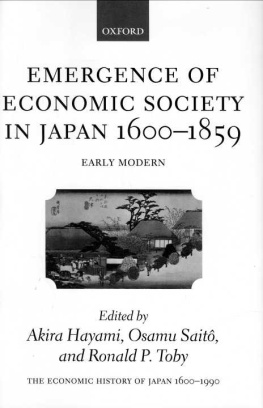First published 2004 by Berg Publishers
Published 2020 by Routledge
2 Park Square, Milton Park, Abingdon, Oxon OX14 4RN
605 Third Avenue, New York, NY 10017
Routledge is an imprint of the Taylor & Francis Group, an informa business
Chie Nakane 2004
All rights reserved. No part of this book may be reprinted or reproduced or utilised in any form or by any electronic, mechanical, or other means, now known or hereafter invented, including photocopying and recording, or in any information storage or retrieval system, without permission in writing from the publishers.
Notice:
Product or corporate names may be trademarks or registered trademarks, and are used only for identification and explanation without intent to infringe.
ISBN 13: 978-1-8597-3874-0 (hbk)
PREFACE
In this essay I present the principles of one important sector of social organization in Japan, and establish its framework.
Japan is a difficult setting for anthropological study because of the enormous diversity and complex integration of the social factors involved. Japanese kinship structure, with its multiple historical and local factors, and unlike that of the Chinese or of the Hindus, does not belong to the category of unilineal systems, nor to any kind of descent pattern found in the published literature of social anthropology. Social anthropology, developed by micro-synchronic studies of simpler societies, and with its major analysis devoted to descent systems, has to face in Japan a critical methodological test. In this essay, I, as a social anthropologist, want to overcome these drawbacks of anthropological method, and to demonstrate one of the new approaches by which an anthropologist can cope with the data from a sophisticated society. I also wish to show how social anthropology can contribute to a field normally dealt with by sociologists, historians and economists.
The materials on which this discussion is based come from a vast amount of data covering various rural areas in Japan as well as more than three centuries of time (from the beginning of the Tokugawa period to the present day). These data partly arise from micro-sociological studies carried out by Japanese scholars during the last fifty years. There are a number of interesting studies of Japanese rural society carried out by American anthropologists, including the important pioneering work of the late J. F. Embree (see Bibliography III). However, my concern here is with the Japanese literature, written in the vernacular by Japanese sociologists, economic historians and other social scientists, and containing a wealth of material not yet fully analysed by western scholars. The examination of this material in the light of modern methods of social anthropology is my chief concern. (In order to avoid confusion, I do not discuss the differing views and the disputes exhibited by these works, because many are not only irrelevant to issues in current social anthropology, but also cannot be understood without explanation of the Japanese academic climate. Also I discuss rather than present the data, a detailed bibliography of which is given at the end of this bookBiblio-graphy II.) Most of this literature, however, is concerned either with the description of particular ethnographic data, or with ideological interpretations of the Japanese family or village structure. Again, many recent works concerned with Japanese kinship use a typological approach, being interested in local varieties of custom in which kinship is taken as one of the cultural elements. None of them has attempted systematic theoretical generalization on the basis of a structural analysis of the data concerned with Japanese kinship, which is the major subject of this essay.
I have supplemented the literary materials by a small set of data derived from field observation of my own in several villages in different areas, including two villages where I have been continuing intensive studies: Gorohei-shinden village in Nagano prefecture and Koshiozu village in Aichi prefecture. I take the view that the value of the findings from an individual's own field work is extremely restricted for the purpose of generalization in a society such as that of Japan, whatever may be the intrinsic importance of the data. Hence my own work is integrated with an immensely greater bulk of research published by others. What I am most concerned with in this study is to interpret different, sometimes apparently contradictory, ethnographic data from various areas, and synthesize them for generalization. I think Japan presents a fortunate field for such a study by an anthropologist, because research by historians and economists is available at the local as well as at the state level. I have used these studies, not as a simple addition to anthropological data, but to give more sophistication to my anthropological method, and as an aid to my interpretation of data. I particularly want to call the attention of anthropologists to this since they have tended to interpret Japanese data within a synchronic context only and with comparatively shallow time depth. Indeed, to some extent the results of my analysis contradict conclusions arrived at by recent field anthropologists who have dealt with Japanese social organization.
I focus upon a couple of major problems which are in my view the most significant, rather than describe the full configuration of elements. Since the social organization constantly changes, any descriptive picture of a given situation cannot present the Japanese social structure. Also, for comparative purposes in a wider historical and geographical context, a certain reduction and selection of elements which comprise a micro-society should be made. Hence, a total descriptive picture of a micro-society is neither the starting point of my discussion nor the model image of Japanese society.
I approach the central problems intentionally through the household and local corporate group of the rural community, whose economy is based on irrigated rice cultivation. In Japan for centuries past the greater part of the population has lived by this traditional pattern of agriculture. The reason I use







